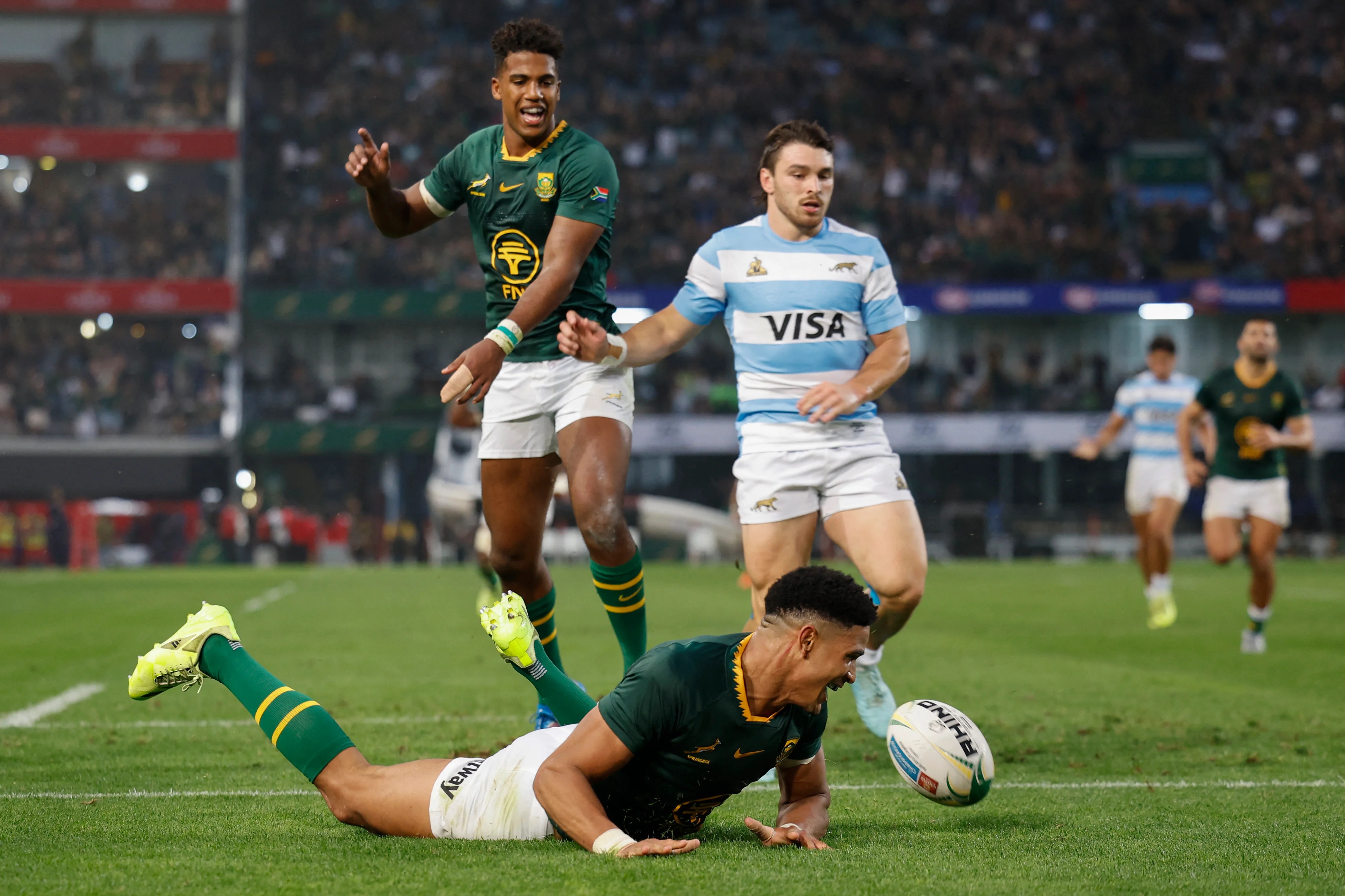
These are busy times in international rugby union, a fast-moving world spinning ever more quickly on its axis. In the next few weeks, it is expected that there will be long overdue confirmation of key information about the new Nations Championship due to launch next year, and of the finer details of New Zealand’s tour of South Africa that will restructure the southern hemisphere winter in 2026 and beyond. In the background, rebel league R360 remains on manoeuvres having secured funding that suggests it will get off the ground – even if some real challenges remain before it is fully realised.
London has taken on a certain centrality within the chaotic, clustered landscape. Not only is the city expected to be confirmed as the host of the inaugural Nations Championship finals next November but most of the sport’s movers and shakers were in town last weekend, too. Their presence, in part, was expected with an era-defining Women’s Rugby World Cup final at Allianz Stadium, Twickenham, but also for a series of World Rugby meetings that will shape the future of the game. New player load guidelines have been introduced, the draw details for the next men’s World Cup have been confirmed and grand plans to crack the United States have been officially backed. There is plenty happening.
For Argentina and South Africa, then, there is a sense of arriving after the Lord Mayor’s Show as the pair pitch up in Twickenham for a Rugby Championship decider with a difference. The Pumas and Springboks were otherwise occupied sharing nearly 100 points in a Durban demolition derby while most others were watching the Red Roses triumph but it is they who take a more central stage in the culmination of a compelling edition of a competition that is looking likelier and likelier to face disbandment beyond this year.
London is far from a traditional locale for a competition that normally restricts its vast sprawl to territories south of the Equator but this is not totally new ground for the Rugby Championship. It is nine years since Australia beat Argentina 33-21 on the Pumas first flirtation with Twickenham, but the identity of the opposition makes it likely that they will find a rather more hostile holiday home than they recall. The strength of the South African population within south-west London is clear on rugby matchdays not involving the Springboks; with the world champions gracing increasingly familiar turf again, the biltong and braais that operate along the Whitton Road will be doing good business.

Why, then, have Argentina ventured north when they know that their passionate fans will be outnumbered? As ever, finances will be a driving force. While a portion of the profits from a lucrative matchday at Twickenham will bolster the coffers for England’s Rugby Football Union (RFU), a not-far-from capacity crowd will also blow past any of the stadiums regularly in use back home in Buenos Aires. Logistically, it makes sense, too – almost all of Felipe Contepomi’s squad are European-based, and an early relocation will make transitioning back to their clubs smoother for the short stint that precedes November’s Quilter Nations Series.
A trip to Twickenham suits South Africa mightily, too. As detailed previously in these pages, building brand Springboks is an increasingly important objective for SA Rugby, with the sort of global cut-through enjoyed by the All Blacks envied. Connecting with the diaspora is a strand of their strategy, particularly in London. This will be the third consecutive year that they have visited for an encounter with a side other than England, while there is a fixture against Japan to come at Wembley in a few weeks’ time.

Unlike for glorified friendlies against New Zealand (2023) and Wales (2024), when the confected Qatar Airways Cup was contested, South Africa this time have legitimate silverware on the line. The Springboks begin the last couplet of Rugby Championship fixtures a point ahead of New Zealand at the top of the table and thus in control of their own destiny. Even a four-point win without a bonus point should be enough to ensure retention of their title, given the vast superiority of their points difference over the All Blacks.
“This match is a final for us, and we know how dangerous Argentina can be,” Rassie Erasmus declared this week, perhaps hoping to ensure that his side remain fully focussed after a rather more chaotic contest last weekend than he would have liked. While South Africa have expanded significantly since the arrival of attack coach Tony Brown, Erasmus underlined that the team had perhaps been over extravagant even in victory. “Since Tony has been with us, he’s trying to find the balance. We are all obviously chasing the perfect game and Saturday wasn’t it. Sixty minutes into the match (the result) was in the balance.”

Argentina’s title hopes were ended by their second-half collapse, and a fresh half-back partnership fielded by Contepomi suggest he has one eye on battles still to come this year and beyond. The increasingly congested and consequential nature of international rugby can make developing depth tricky – it is an area in which South Africa, with the rotation of three high-class fly halves perhaps most illustrative after Sacha Feinberg-Mngomezulu’s star-turn, remain ahead of the pack.




